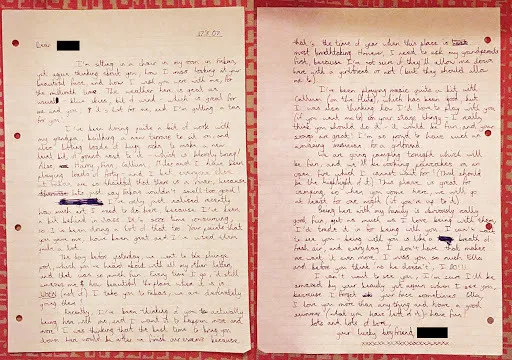When Love Letters Were Real: Before Relationships Became Content

There was a time in Africa when love wasn’t about likes, aesthetics, or algorithmic approval. When affection was written in long sentences on folded paper, sealed with perfume, and delivered through friends or postmen. That time now feels like a relic of a simpler age, one where emotion was not performed but expressed. Back then, every love letter was a story, not a statement. It carried the weight of waiting, the ache of distance, and the beauty of sincerity that today’s generation often trades for digital display.
Across many cities in Africa like Lagos, Nairobi, and Accra, handwritten letters were once the lifeline of relationships. People didn’t need curated captions or romantic reels to prove affection. A carefully written note, delivered days later, said far more than any emoji could. There was something profoundly human about that process, a slow ritual that made love intentional. Today, however, the speed of communication has replaced its soul. Relationships unfold on screens, where love is seen more than it is felt.
The evolution of romance mirrors the evolution of technology. The rise of social media changed everything, it blurred the line between intimacy and exposure. Now, love is often content. Moments meant for two become performances for thousands. A private anniversary turns into a public slideshow. The sincerity that once thrived in quiet expression now competes for digital engagement. This isn’t just nostalgia; it’s a social shift that redefined what connection means in the modern African context.
Before the internet’s boom, letters created emotional literacy. People learned how to articulate feelings, to build emotional patience. Reading someone’s handwriting was an experience, their words had texture, their pauses had meaning. But with instant messaging, patience became outdated. Modern relationships thrive on speed, not substance. If someone doesn’t reply fast enough, love feels threatened. That’s how fragile affection has become in the digital age.

Letters were never purely private; they moved through intermediaries; friends, siblings, and trusted messengers who carried secrets, sealed promises, and sometimes reputations. In many African communities, delivering a note was as social as it was romantic: entire households knew when love arrived. This communal role of correspondence also meant relationships were woven into wider social fabrics, binding neighbourhood together in ways instant chat rarely does.
The tragedy of our time is that privacy has become old-fashioned. Many young Africans now equate visibility with validation, the more public your relationship, the more “real” it seems. Yet, this visibility often turns affection into performance. Couples now measure love by captions, not conversations; by couple challenges, not companionship. A study by the University of Lagos Centre for Communication Research noted that 64% of young people admit to posting romantic content for public perception, not genuine emotion.
This obsession with public proof has consequences. When love becomes content, it starts to depend on external validation. People fall in love with how their relationships look, not how they feel. And when problems arise, as they inevitably do, the same audience that applauded becomes the jury. In a world where “soft life” culture and “couple goals” dominate timelines, vulnerability has become unfashionable.
Yet, not all is lost. In small, quiet corners, the old kind of love still survives. Handwritten notes tucked into books, voice notes that sound like confessions, and unposted photos kept private. These gestures remind us that love’s power lies not in display but in depth. A generation that rediscovers privacy will rediscover sincerity. The digital world may have changed the language of love, but it hasn’t erased the longing for authenticity.
It’s important to remember that technology isn’t the villain, we are. Social media, for all its chaos, only amplifies what we feed it. The need to be seen, admired, or envied comes from our own insecurity. True love has always been countercultural, it thrives in silence, honesty, and mutual growth. Before the internet, Africans didn’t need validation to love deeply. Today, that lesson feels more urgent than ever.
Love turns into competition

What began as affection has turned into competition. Modern relationships are often measured by the size of surprises, the price of gifts, and how “Instagrammable” each gesture looks. From Valentine’s Day billboards in Lagos to public proposals filmed for clout, love has become a spectator sport. Couples now stage moments that once belonged only to two hearts as if affection needs an audience to be believed.
Even the idea of a “perfect partner” has been redefined by capitalism. Love is often confused with the ability to spend, not the capacity to stay. In cities like Nairobi or Accra, where living costs are high and salaries rarely match expectations, partners compete through gifts they can’t afford just to match online trends. This consumer-driven affection fuels silent anxiety, a generation pressured to prove love through material excess.
But not every relationship wants to play by those rules. A quiet resistance is growing among young Africans who value privacy and presence over public proof. For them, the softest love is the unseen one, messages deleted, photos unposted, and gestures made without witnesses. They see love not as a brand but as a bond one that doesn’t need a logo or trending hashtag. Their stories are often drowned out by the noise of performative affection, but they’re building a new culture of sincerity, away from screens.
Perhaps that’s where we circle back to the past, not out of nostalgia, but as a blueprint. Love letters weren’t just romantic; they were radical acts of patience and attention. Reclaiming that mindset today means protecting intimacy from exposure. It means letting affection breathe in silence again no cameras, no captions, just connection. As platforms like Instagram and TikTok continue to shape what relationships look like, the question remains: what do they still feel like?
Conclusion
The past reminds us of something beautiful, love as communication, not performance. When letters took days to arrive, people had time to think, to mean what they said. In the slowness of pen and paper, there was care. That care is what our generation risks losing amid hashtags and highlight reels. To revive it, we must remember: love is not a brand, not a trend, and not a tool for engagement. It is, and always will be, the quiet art of choosing someone, even when no one is watching.
You may also like...
The Day Nigeria Fell in Love With Fuel Scarcity

How Nigeria turned fuel scarcity into a strange national tradition of endurance, humour, and survival. A satirical yet s...
Terraforming Mars: Dream, Delusion, or the Next Frontier?

Can we really turn Mars into a second Earth, or are we chasing a dangerous dream while neglecting our own planet? It’s t...
When Love Letters Were Real: Before Relationships Became Content

Before likes and DMs defined affection, love in Africa was handwritten, raw, and real. This piece revisits the lost art ...
Rangers Eye Steven Gerrard for Managerial Return Following Russell Martin Exit

Steven Gerrard is the leading candidate to replace Russell Martin as Rangers manager, with reports suggesting the club i...
Ray Winstone Reveals Epic Drunken Star Wars Audition Fail

Ray Winstone shares a candid account of his disastrous “Star Wars” audition for Padmé Amidala's father, admitting he was...
Hollywood Icon Nancylee Myatt, TV Creator, Dies at 68

Nancylee Myatt, an Emmy-winning television writer and producer known for creating NBC's "Social Studies" and her work on...
Zach Bryan Ignites Firestorm: Artist Defends 'Misconstrued' ICE Song Amidst Public Outcry

Zach Bryan clarified the controversy surrounding a recent song snippet, asserting his lyrics about police and ICE were "...
SEVENTEEN Duo Unlocks 'HYPE VIBES': S.Coups & Mingyu Reveal Their Most Authentic Album Yet

K-pop powerhouse SEVENTEEN continues to expand its musical horizons with the debut of its new unit, CxM, featuring S.Cou...